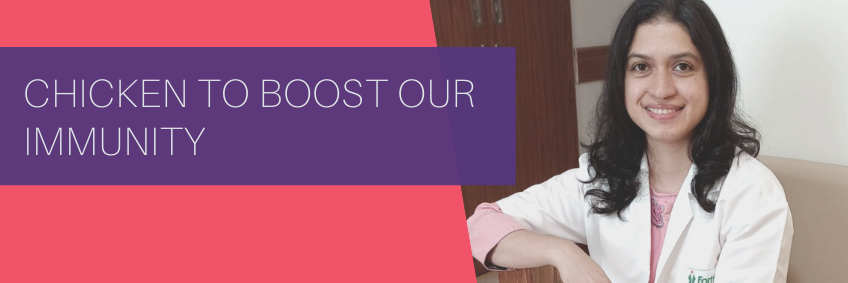The Coronavirus pandemic has shaken everyone across the world. While doctors, medicare staff, and the police are working hard to fight the pandemic, it is very important for the public to take care of themselves too. That can begin by consuming healthy food for a stronger immune system. Kids below 10 years and the elderly have to be more cautious and maintain a healthy diet to fight the virus. Chicken is something many say, will provide the body with required proteins and help maintain a better immune system. Anushka Baindur, Senior Dietician, Fortis Hospital, find out ways to build a stronger immune system by eating chicken, other diets to follow, and more…
1) How can we build our immunity by eating chicken? What are the elements that chicken consists that helps boost the immunity of people across all age groups?
Anushka Baindur: Our immune system has several components like antibodies and immune cells that depend on protein. Hence, protein is a quintessential requirement for our immune system. Chicken being a source of high-quality protein can, therefore, help in boosting one’s immunity. Apart from protein, chicken is also a good source of various other nutrients, like Retinol (an active form of Vitamin A) Vitamin B B3, Vitamin B9, Zinc, etc. that also have some or the other role to play in immune functioning.
2) Is it advisable to consume chicken during summer since many feel chicken increases the amount of heat production in our body not knowing whether its a myth or a fact?
Anushka Baindur: There is no scientific evidence stating that chicken intake should be avoided in the summer. Although one needs to take care that it is cooked well to eliminate any chances of stomach infection which can be more prevalent in the summer season.
3) How much quantity of chicken is advisable to consume in a week and in what form?
Anushka Baindur: The quantity and frequency of consumption in a week depends on a person’s requirement and also activity level. An athlete or a person doing high-intensity workouts can take it more often than a sedentary person. Also as protein intake corresponds to a person’s body weight, intake can vary from one person to another. Also, use healthier methods like boiling and grilling rather than deep fat frying.
4) What are the benefits of having chicken?
Anushka Baindur: Chicken is a source of high biological value protein. Adding chicken in the diet can help meet daily protein needs. It helps in faster wound healing due to its high protein and zinc content. Being a good source of niacin it boosts brain function, protects the skin from sun damage, and can ease symptoms of osteoarthritis. Moreover, a bowl of warm chicken soup is comforting and can alleviate cold symptoms as it may contain substances that have anti-inflammatory properties.
5) If not chicken, what is the substitute food one can consume for their vegetarian diet?
Anushka Baindur: Chicken is a good source of high biological value, which means it has all the essential amino acids present in it. Vegetarian foods do not have any such source, but a combination of cereal and pulse, e.g. rice and dal together will have all the essential amino acids, making it a complete protein. There are numerous protein sources even in the vegetarian diet like all dals, whole pulses like channa, rajma, green moong, soya milk, and milk products like paneer, nuts, tofu, etc. It is imperative for a vegetarian to include these sources in their daily diets.
6) What is the best dish that goes along with chicken?
Anushka Baindur: Chicken can be paired with wheat/ millet rotis, rice, or even with just a bowl of vegetable salad.
7) Can you share the diet chart to be followed by kids for a healthier immune system?
Anushka Baindur: A diet chart is always individualized and can vary from person to person. Hence, there is no “one size fits all” diet chart even for kids. But for a healthier immunity include protein foods like eggs, chicken, fish, paneer, dal, and pulses, nuts, etc. in their daily diet. Kids can be given a concoction or kadha or kashaya made by boiling onions, tulsi leaves, ginger, and spices like pepper, cumin, coriander, turmeric with some added honey. Ensure adequate vegetable intake in forms acceptable by kids like a palak, methi or drumstick leaves paratha, mixed vegetable and protein cutlets, pasta or noodles made in a healthy way with plenty of added veggies. Nuts and dried fruits like almonds, pistachios, rains, dates, etc. can be eaten as such or made into milkshakes, chikkis, ladoos, etc. Include 2-3 servings of fruits daily. Maintain good hydration using water, buttermilk, coconut water, traditional beverages like kokum, and bael ka sharbat.

